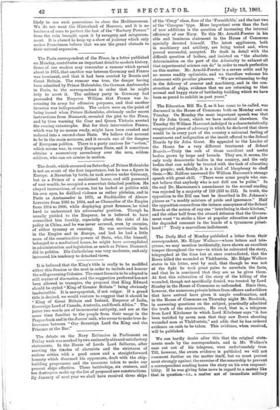The Education Bill No. 2, as it has come to
be called, was discussed in the House of Commons both on Monday and on Tuesday. On Monday the most important speech was that by Sir John Gorst, which we have noticed elsewhere. On Tuesday Sir William Harcourt indulged in a characteristically exaggerated piece of advocacy in which he declared that there would be in every part of the country a universal feeling of resentment and indignation at the insult offered to the School Boards by Sir John Gorst. He appealed to the Leader of the House for a very different treatment of School Boards.—Truly the cult of those excellent and useful bodies grows by leaps and bounds. They are, it seems, the only truly democratic bodies in the country, and the only bodies that can safely be trusted with the task of educating the people ; and, finally, it is a kind of blasphemy to chaff
them.—Mr. Balfour answered Sir William Harcourt's strange speech with great skill. "There were some people who can- not believe that anybody who is not dull can be polite." In the end Dr. Macnamara's amendment to the second reading was rejected by a majority of 118 (333 to 215). In truth, the
opposition to the Bill can best be described in Dr. Johnson's
phrase as "a muddy mixture of pride and ignorance." Half the opposition comes from the intense annoyance of the School Boards at the notion of any one "interfering in their kitchen," and the other half from the absurd delusion that the Govern. ment want "to strike a blow at popular education and place the degraded remnant in the hands of a tyrannous priest- hood ! " Truly a marvellous indictment.






































 Previous page
Previous page